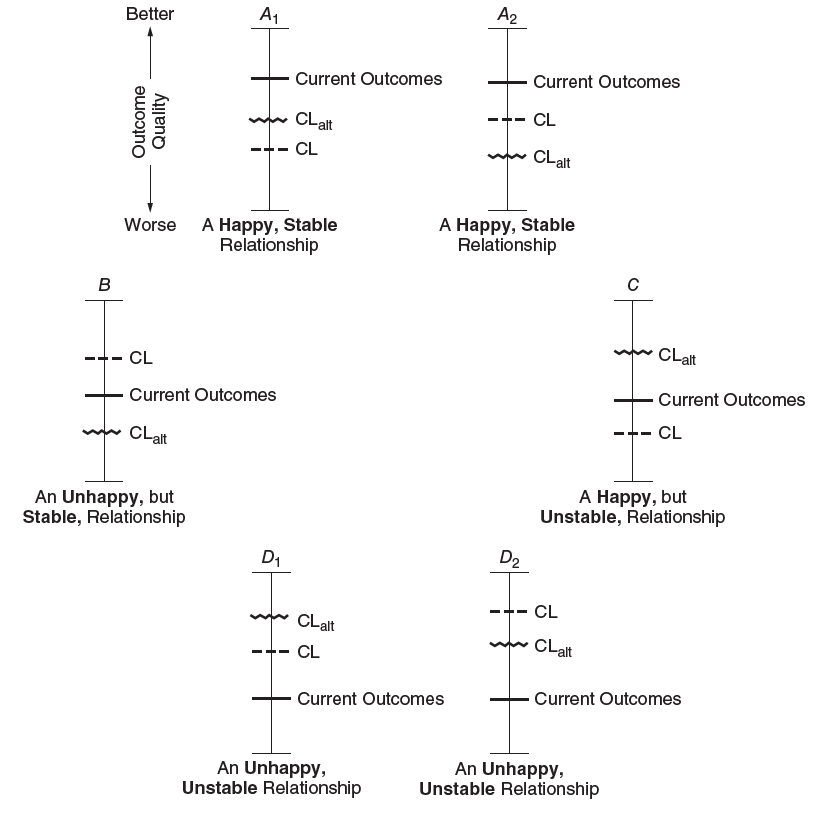I can also tell you when you will break-up with your partner, when you will stop being friends with someone, when you will move out of your house, when you will get a new car / phone, and so on.
Wherever there is a relationship of some kind involved, I can tell you when you will end that relationship.
If you read further on the Interdependence theory, you will be able to tell that as well.
The math behind interdependence theory is straight-forward. It deals with just three variables - Comparison Level (CL), Comparison Level of alternatives (CL alt) and current outcomes.
The Comparison Level is your expectations from the job and the relationship. It is what you think you deserve. The Comparison Level of alternatives is what is available to you outside of your current job or setting. And current outcomes are what you are actually getting right now, which can be further broken down into rewards and costs, making it a difference between rewards and costs.
For example, in the case of your job, if you think you deserve to be heading a team of twenty people and reporting to the CEO and working on the most important project and earning seven figures in a year with stock options and hefty bonuses, that is your Comparison Level. If you know what is being offered at companies other than your own where you can do the same kind of job that you do now, that is then the Comparison Level of alternatives. And the reality of your current situation makes up the current outcomes, where your pay and working on an important project might be rewards while long hours and an annoying boss or co-worker might be costs.
First, there is the question of satisfaction.
As I often say, happiness is reality over expectations.
Which means, even if your current outcomes are positive (i.e. rewards > costs), you might still be unsatisfied because your Comparison Level (expectations) are even higher. And you become satisfied only when your current outcomes are greater than your Comparison Level.
Then there is the question of dependence.
If your current outcomes are greater than the Comparison Level of alternatives, then you are dependent. This is the case where you turn up to work every day and do your bit even when you hate your job because there is no better alternative out there (by the way, quitting is an alternative too!). And if your current outcomes are lower than the Comparison Level of alternatives, then you are independent. You can always decide to quit and walk out and get something better. In this case, the dependence is reversed and the employer (or your partner) is now dependent on you.
With this understanding, you can easily see that there are four kinds of relationships that you can be in (see image at the top).
When your current outcomes are higher than both your Comparison Level and the Comparison Level of alternatives, you are in a happy stable relationship.
It doesn't matter whether your Comparison Level is higher or lower than the Comparison Level of alternatives. Because, what you are getting is more than what you think you deserve or what you can get outside.
When your current outcomes are lower than both your Comparison Level and your Comparison Level of alternatives, then you are in an unhappy unstable relationship. If you are here, you are going to quit or break up very soon. Because, what you are getting is worse than what you think you deserve and also worse than the alternatives you have.
When your CL > current outcomes > CL alt, then you are in an unhappy but stable relationship. This is the case where you think you deserve more but the alternatives available are even worse than what you are getting now. So you will be disengaged and put in the hours, but just enough to not be fired.
When your CL alt > current outcomes > CL, then you are in a happy but unstable relationship. You are getting more than what you think you deserve, but you notice even better opportunities outside, and might be ready to jump at one of them. This is when you are happy and engaged in your job, but are still willing to take up a better opportunity if it comes along.
Social media (Facebook and Instagram especially) has been playing a big role in pushing up our CL. We constantly see others like us doing things that we aren't doing ourselves and begin to think we deserve it as well.
Professional networking and dating apps (LinkedIn and Tinder especially) have been playing a big role in pushing up our CL alt. We constantly see so many options that probabilistically have a fair portion of alternatives better than our current scenario.
But the reality of current outcomes hasn't really been changing at all. In fact, they might be getting better but not at the pace that CL and CL alt have been getting better.
If I plot all three variables on a graph with time as the other axis, it isn't in the least bit surprising to see why jobs and relationships don't last as long as they used to before, and more people are ending up in unhappy and unstable relationships.





CONVERSATION